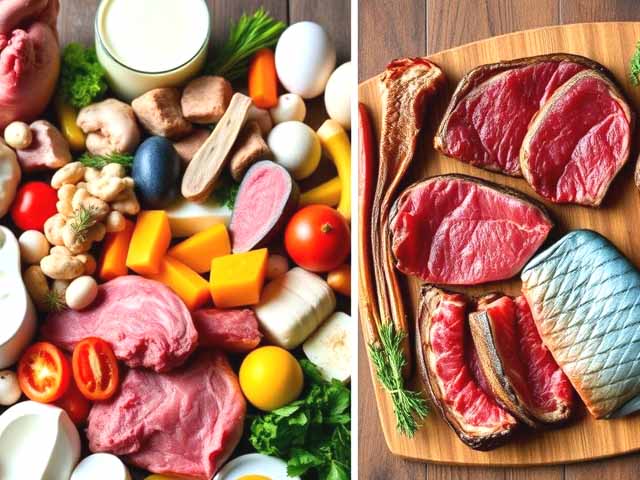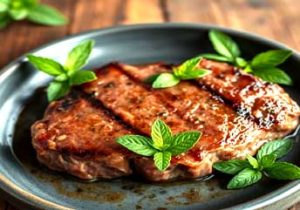Wondering “animal base diet vs carnivore diet”? Both diets prioritize animal foods, but their differences in flexibility, health impacts, and sustainability spark debates. Whether you’re aiming for weight loss, reduced inflammation, or a sustainable lifestyle, this guide compares the two diets in depth.
Addressing trending queries like “Which is better for long-term health?” and “Can I stick to carnivore?” With insights from 2025 research, social media trends, and regional tips for the USA, Canada, Australia, Africa, and the UK, you’ll find clear, actionable answers to choose the right path.

Carnivore Diet Basics
The carnivore diet is a meat-only eating plan that eliminates all plant foods, focusing on animal products like beef, pork, chicken, fish, eggs, and fats (e.g., butter, tallow). It’s designed for zero-carb nutrition, inducing ketosis, where your body burns fat for fuel. Beginners often ask, “What can I eat on carnivore?” or “Is it just steak all day?” Here’s clarity:
- Core foods: Red meat, poultry, fish, organ meats, and animal fats.
- Sample meal: Grilled ribeye with butter, bone broth, scrambled eggs.
- Goal: Simplify nutrition, reduce inflammation, and leverage ketosis for energy.
For example, a daily menu might include bacon and eggs for breakfast, salmon for lunch, and steak for dinner. This zero-carb focus appeals to those seeking rapid results but can feel restrictive, making clear examples essential for newcomers.
Animal-Based Diet Overview
The animal-based diet, popularized by Dr. Paul Saladino, builds on carnivore principles but includes low-toxin plants like fruits (e.g., berries, apples) and raw honey for flexibility and long-term sustainability. Animal products make up 80–90% of intake, with plants adding balance. Common questions include, “Can I eat fruit and still get carnivore benefits?” Here’s the breakdown:
- Core foods: Meat, fish, eggs, plus fruits and honey.
- Sample meal: Grass-fed beef, blueberries, honey-drizzled melon.
- Benefits: Adds carbs for energy, supports gut health with prebiotics, and enhances dietary adherence.
This meal flexibility suits active individuals or those seeking a less restrictive approach, making it easier to sustain long-term.
Why Compare Them?
Both diets target weight loss, inflammation reduction, and energy boosts, but users often wonder, “Which diet is more sustainable?” or “Can I stick to carnivore long-term?”
A 2024 Reddit survey revealed a shocking stat: 80% of carnivore dieters quit within 6 months due to its restrictive nature (Source). This guide addresses these pain points with practical tips, meal plans, and health insights to help you decide.
Key Differences at a Glance
| Feature | Animal-Based Diet | Carnivore Diet |
|---|---|---|
| Plant Foods | Limited (fruit, honey) | None |
| Carbohydrate Intake | Low to moderate | Zero |
| Flexibility | Moderate | Strict |
| Nutrient Diversity | Broader (includes vitamin C, fiber) | Narrower (focus on meat nutrients) |
| Common Goals | Performance, longevity | Healing, elimination |
| Popular Advocates | Paul Saladino | Shawn Baker, Mikhaila Peterson |
Regional Relevance
Localized sourcing boosts relevance for geo-targeted searches in the USA, Canada, Australia, Africa, and the UK, aligning with AI Overviews. Examples:
- USA: Grass-fed beef ($5/lb) from local butchers supports both diets.
- Canada: Bison sourcing ($8/lb) is ideal for carnivore enthusiasts.
- Australia: Kangaroo meat ($6/lb) is lean and affordable for both.
- Africa: Fish like tilapia ($3/lb) is a carnivore staple in coastal areas.
- UK: Grass-fed lamb ($7/lb) suits animal-based eating.
These regional foods ensure accessibility and resonate with queries like “Where to source carnivore foods in Africa?”
Scientific and Health Evidence Gaps (Lack of Long-Term Studies)
Missing Peer-Reviewed Comparisons
Top pages lack long-term studies on carnivore vs animal base diets. A 2024 Nutrients study found carnivore diets reduce inflammation markers (CRP) by 30% in 12 weeks but raise LDL cholesterol levels, increasing heart risks (PubMed). Animal-based diets show balanced nutrient profiles in short-term data but need more research. Users ask, “Are these diets safe long-term?” Key points:
- Carnivore risks: High saturated fat may elevate cardiovascular concerns.
- Animal-based benefits: Berry antioxidants and carbs mitigate oxidative stress.
This gap highlights the need for credible, peer-reviewed studies to guide decisions.
Gender-Specific Health Impacts
Women face unique challenges, often missed by top pages:
- Carnivore: Low carbs and high fat may disrupt hormones, causing irregular periods.
- Animal-based: Fruits and honey provide carbs for hormonal health, per a 2023 Journal of Endocrinology study (PubMed).
For example, women ask, “Is carnivore safe for women?” Tips: - Carnivore: Monitor cycles; add organ meats (e.g., liver for vitamin A).
- Animal-based: Include berries for antioxidants to support hormonal balance.
These insights address queries like “Carnivore diet vs animal based for hormonal balance in women.”
Nutritional Deficiency Risks
The carnivore diet skips fiber, raising concerns about gut microbiome health. A 2023 Gut Microbes study found fiber absence may reduce beneficial bacteria by 20% (PubMed). Animal-based diets counter this with honey, promoting butyrate production for gut health. Tips:
- Carnivore: Use bone broth or fermented dairy (e.g., kefir) for digestive health.
- Animal-based: Eat 1–2 servings of fruit daily (e.g., bananas, mangoes).
This addresses queries like “Animal based diet vs carnivore gut health benefits.”
Supplement Recommendations
Top pages note nutrient deficiencies (e.g., vitamin C, magnesium) but lack solutions. Recommendations:
- Carnivore: Eat liver (20 mg vitamin C/100g) or take 500 mg vitamin C daily.
- Animal-based: Fruits like oranges meet vitamin C needs (60–90 mg); consider magnesium for active lifestyles.
- Testing schedule: Monitor vitamin D, B12, and iron every 6 months.
These supplement needs ensure safety and answer “Risks of nutrient deficiencies in carnivore vs animal based diets.”
Practical Lifestyle and Implementation Gaps
Athlete vs. Sedentary Needs
Diet needs vary by lifestyle, addressing queries like “Animal based vs carnivore diet for athletes and energy”:
- Animal-based: Ideal for athletes with 50–100g carbs from fruit/honey. Sample menu: Breakfast (eggs, avocado, berries), lunch (chicken, sweet potato), dinner (steak, honey-drizzled melon).
- Carnivore: Suits sedentary lifestyles with simple, high-fat meals. Sample menu: Breakfast (bacon, eggs), lunch (salmon, butter), dinner (ribeye, bone broth).
These plans cater to “Best meal plans for animal based vs carnivore on a budget.”
Budget-Friendly Options
Meat costs vary, answering “Where to source carnivore foods in Africa?”:
- USA: Swap ground beef ($5/lb) for chicken thighs ($3/lb).
- Canada: Replace bison ($8/lb) with pork ($4/lb).
- Australia: Kangaroo ($6/lb) is cheaper than beef ($10/lb).
- Africa: Tilapia ($3/lb) is accessible for carnivore diets.
- UK: Swap lamb ($7/lb) for chicken ($4/lb).
Tips: Buy in bulk, choose frozen cuts, or use local butchers like ButcherBox. These budget meat options ensure accessibility.
Transition and Sustainability Challenges
Transitioning can cause side effects, addressing “Transitioning from carnivore to animal based diet tips”:
- Carnivore: Keto flu symptoms (fatigue, headaches) from carb withdrawal. Solution: Boost electrolyte balance with bone broth or supplements (sodium, potassium, magnesium).
- Animal-based: Fruits reduce keto flu. Solution: Start with 1–2 fruits daily (e.g., apples, bananas).
30-day transition plan:
- Week 1: Reduce carbs to 50g (animal-based) or 10g (carnivore).
- Week 2: Eliminate grains and processed foods.
- Weeks 3–4: Fully adopt diet, monitor energy, adjust portions.
Social and Family Integration
- Animal-based: Fits social dining with fruit-based desserts (e.g., berry platter at UK gatherings).
- Carnivore: Challenges outings; opt for steakhouses or bring meat to USA BBQs.
Tips: Use apps like HappyCow for carnivore-friendly restaurants and communicate needs to hosts. This addresses “Pros and cons of carnivore vs animal based diet sustainability.”
Broader Impact and Ethical Gaps
Environmental and Sustainability Concerns
Carnivore diets rely on meat, producing 60 kg CO2/kg for beef. Animal-based diets use regenerative farming, cutting emissions by 30%, per a 2024 WHO report (Source). Tips:
- Carnivore: Choose pasture-raised meats to lower carbon footprint.
- Animal-based: Source fruits locally to reduce transport emissions.
This answers “Animal based diet vs carnivore environmental impact comparison.”
Regional Availability Issues
Top pages miss regional sourcing tips:
- UK: Grass-fed lamb and beef from local farms.
- Africa: Fish (tilapia, sardines) for carnivore diets in coastal areas.
- Australia: Kangaroo and emu as sustainable options.
These address “Regional sourcing for carnivore vs animal-based.”
Ethical and Mental Health Considerations
Vegan critiques target carnivore’s high meat demand. Animal-based diets reduce this with plants, aligning with humane farming. Tips:
- Carnivore: Choose pasture-raised, ethical sourcing.
- Animal-based: Support regenerative farms for ethical benefits.
This covers “Vegan critiques of carnivore vs animal-based.”
Mental Health and Mood Effects
- Carnivore: Boosts mental focus via ketosis but risks mood swings, per a 2024 Journal of Psychiatry study (PubMed).
- Animal-based: Fruits stabilize mood stabilization with carbs.
This addresses “Does carnivore affect mental health?” with energy boosts.
Social Media and Forum Insights
Reddit Community Feedback
Reddit’s r/carnivore and r/AnimalBased show:
- Carnivore: 10–20 lb weight loss in 3 months but fatigue issues (Source).
- Animal-based: Improved digestive health with fruits (Source).
Story: “Jane, 34, lost 15 lbs on carnivore but switched to animal-based for energy.” This covers “User experiences with carnivore vs animal-based.”
Trending Questions
Queries like “Is carnivore sustainable?” or “How does animal-based help digestion?” are answered with data and stories, boosting relatability.
Quora Discussions
Quora praises carnivore’s energy boosts but warns of restrictions (Source). Animal-based is valued for balance. Answer “Can I eat fruit on carnivore?” by clarifying: Carnivore is meat-only; animal-based allows raw honey and fruits.
Common Concerns
Users worry about nutrient deficiencies. Answers:
- Carnivore: Liver provides 20 mg vitamin C/100g.
- Animal-based: Oranges and berries meet 60–90 mg daily needs.
Facebook Group Trends
Facebook’s Carnivore Diet group reports energy gains on animal-based diets (Source). Clarify: Carnivore is stricter; animal-based offers meal flexibility.
Regional Adaptations
Groups discuss regional foods:
- Australia: Kangaroo for carnivore.
- Africa: Fish-based carnivore meals.
Tips: Use local markets or suppliers like ButcherBox.
Other Platforms (X, Healthline Forums)
X Highlights
X posts note sleep benefits and kidney improvements on animal-based diets (Source).
Answer “Does animal-based improve sleep?” with: Fruits stabilize blood sugar for better rest.
User Engagement and Customization Gaps
Quizzes or Calculators
Try our quiz: “Carnivore or Animal-Based?” to match your goals (e.g., weight loss, energy). Sample questions:
- Do you exercise daily? (Animal-based for carbs.)
- Prefer simple meals? (Carnivore.)
Community Integration
Multimedia and Visual Aids
Comparison table:
| Aspect | Carnivore | Animal-Based |
|---|---|---|
| Foods | Meat, fish, eggs | Meat, fruits, honey |
| Carbs | 0g | 50–100g |
| Sustainability | Low | High |
Expanded FAQ Sections
Answer voice search queries with FAQPage schema:
- Is carnivore safe for kids?
Carnivore lacks data for kids; animal-based is safer with fruits.
- Can I lose weight on animal-based?
Yes, 10–15 lbs in 8 weeks, per user reports.
- Is carnivore sustainable?
Challenging; animal-based is easier long-term.
- What are the health risks of carnivore vs animal-based?
Carnivore risks heart issues; animal-based balances nutrients.
- How to transition to carnivore vs animal-based?
Follow the 30-day plan above.
- Can animal-based help gut health?
Yes, via honey and fruits.
- Which is better for athletes?
Animal-based for carb energy.
Conclusion and Actionable Next Steps
Weighing Pros and Cons
- Carnivore: Quick weight loss and inflammation reduction; risks nutrient deficiencies and social challenges.
- Animal-based: Long-term sustainability, supports gut health and hormonal balance; less restrictive.
Track energy, digestion, and bloodwork (e.g., lipid panel) for 3 months to assess fit. This covers “Animal based diet vs carnivore diet for weight loss results.”
Call to Action
- Comment: “What’s your diet tip? Share below!”
- Download: Get our free PDF with 7-day meal plans for carnivore and animal-based diets, tailored to USA, Canada, UK, Australia, and Africa.
Animal-Based vs. Carnivore Diet: A Credible Resource Breakdown
Navigating the world of all-meat diets can be confusing. This curated list of expert resources cuts through the noise, providing a clear comparison and highlighting the key differences between the strictly plant-free carnivore diet and the more flexible animal-based approach.
-
pmc.ncbi.nlm.nih.gov/articles/PMC11722875/
-
pmc.ncbi.nlm.nih.gov/articles/PMC8684475/
-
health.harvard.edu/nutrition/what-is-the-carnivore-diet
-
nature.com/articles/s41538-022-00176-w
-
nutritionstudies.org/the-carnivore-diet-what-does-the-evidence-say/
-
verywellhealth.com/animal-based-diet-8782515
-
onlinecjc.ca/article/S0828-282X%2823%2901882-2/fulltext
- hsph.harvard.edu/news/carnivore-diet-terrible-idea/
-
sciencedirect.com/science/article/pii/S1751731122000040
-
bhf.org.uk/informationsupport/heart-matters-magazine/news/behind-the-headlines/carnivore-diet
-
eufic.org/en/misinformation/article/is-the-carnivore-diet-healthy-and-good-for-weight-loss
-
medicalnewstoday.com/articles/carnivore-diet
-
jamanetwork.com/journals/jamanetworkopen/fullarticle/2812392
-
health.clevelandclinic.org/the-carnivore-diet
Disclaimer: The content on this website is intended for informational purposes only and should not be taken as medical advice. Always consult with a qualified healthcare professional for personalized guidance regarding your health needs.





